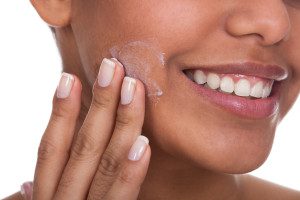By Guest Blogger, Duane R.
What Skincare Routine You Should Follow Based on Your Skin Type

This article was submitted by Cosmetology & Spa Academy. Located in Illinois, CSA is a beauty school with over 30 years of experience in the cosmetology, esthetics and beauty industry.
When it comes to skincare, your unique skin type should determine what types of treatments you apply. The same cream or gel won’t work for each person because these solutions are designed with particular skin types in mind. It’s not a one size fits all industry. Below, we delve deeper into the issue and provide some advice as to how to properly treat each unique skin type.
The Many Skin Types
When you broach the subject of skin type, the first thing that you should do is forget all that you have learned from aestheticians, magazines and so-called experts on television.
They have one common goal and that is to sell you more skincare items. This means that they have not told you the entire truth about skincare and skin types.
While the standard categories of dry and oily are good starting points, they do not shed light on the grey area that most of us fall into. Most people do not have overly dry or overly oily skin.
They tend to fall in between these extremes. Think about all of the people who suffer from acne, eczema, rosacea and sun damage. Their skin types don’t fall within the rigid categories of oily and dry.
Consider how skin types can change according to hormones, environmental and biological stresses and even weather. Each unique skin type will require a distinct product formulation.
The key is to educate yourself about the nuances of each skin type to determine the proper treatment. You can learn the intricacies of each type of skin from an esthetics program. This way, you will know how to treat your skin when its type alters due to factors like the incorporation of a new medication, changes in your diet, picking up a smoking habit, hormonal changes, sun exposure etc.
Skincare Solutions Can Actually Be Problems
It is imperative to understand that certain skincare products can actually make your skin worse. Numerous products are designed to treat one specific skin type or skin problem but contain ingredients that will irritate other skin types and produce a brand new problem. Consider the skincare products designed to treat acne. Many have a substantial amount of alcohol or problematic ingredients like citrus or peppermint that can actually irritate the skin and cause even more oil to be produced.
Many people have never identified their actual skin type because they have been using products with ingredients that produce the problems that they thought to be intrinsic to their skin.
Always look at your skin products’ ingredients list to see what you are really applying to your face and body. Give yourself some time in between products to fully understand your skin’s true type and how it really behaves. Beware of troublesome ingredients like thick emollients, abrasive scrubbing agents, pore clogging waxes, organic and synthetic irritants, menthol, alcohol and citrus.
Skin Types
Consider that your face likely has a combination of skin types. More oil is produced from the glands at the center of your face so you will likely have more clogged pores in this area. Take a shower, apply a gentle cleanser and use a toner with antioxidants and ingredients that repair skin. Leave it alone for a couple of hours to see how your skin reacts. This will help you determine your true skin type.
• If your skin has excess oil or oily areas combined with dry areas after you’ve waited 4 hours after cleansing your skin, your skin type is “oilyâ€.
• Those who experience moderate breakouts during hormone cycles have “acne†or “blemish-prone†skin type.
• If your skin appears flaky and tight, your skin type is “dry.â€
• Those who experience redness with or without bumps but no acne likely have a “sensitive / rosacea†skin type.
• Individuals with reddish skin or dry flaky patches that itch, swell or burn have eczema.
• If you experience fine lines and/or discolorations, your skin is likely sun damaged.
• Those with lines around the cheeks, mouth and eyes have aging/wrinkled skin.
• Normal skin is characterized by no indications of dryness or oiliness.
Treatment
Once you have determined your true skin type, it is time to choose the proper formula. It is true that each type of skin can benefit from certain ingredients present in a wide variety of skincare solutions. Yet there are distinct ingredients in some skincare products that are meant specifically for one unique skin type. For example, those who suffer from acne will need to treat their skin with benzoyl peroxide.
In general, creams, serums and lotions work best on dry skin. Liquids and gels work best on oily skin or skin that is prone to blemishes. Combination skin types can be treated with all types of skin care solutions but for powders and creams. Individuals with sensitive skin / rosacea can treat with all skincare types but for powder based solutions.
Those who suffer from aging skin with wrinkles or sun-damaged skin will be best served by avoiding liquid and powder based skincare products.
Those with normal skin often benefit the most from serums and light lotions but they can use just about any type of skincare product without significant worries. It is important to point out that most people have different skin types on the face. Therefore, it is prudent to use specific skincare products in each unique section of the face as appropriate.
Tia, and TipsfromTia.com is trying to keep you looking good and
feeling good, from the inside out. If you’ve got a problem or a tip email me!
